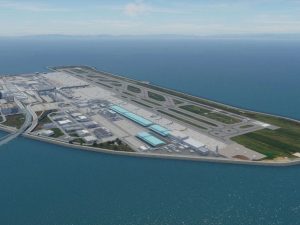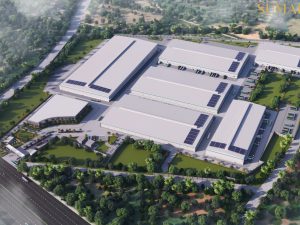DP World, the Deendayal Port Authority (DPA), and Nevomo have signed MoU to explore potential opportunities for cooperation in the development and implementation of a pilot project using Nevomo’s MagRail proprietary technology for the self-propelled movement of rail-based cargo and freight within the existing port ecosystems. DP World is leading efforts to introduce advanced freight technology aimed at transforming cargo movement in India. Deendayal Port Authority (DPA), a key multi-cargo port under the Government of India, is facilitating exploration of this technology at its terminal in Kandla to evaluate the feasibility of this futuristic freight transportation system. The initiative marks a significant step toward building faster, more efficient, and sustainable port-hinterland connectivity. This initiative is aligned with India’s National Logistics Policy and PM Gati Shakti agenda aimed at modernizing and integrating the country’s logistics infrastructure. The MoU was signed by Shri Sushil Kumar Singh, IRSME, Chairman of Deendayal Port Authority (DPA), Rizwan Soomar, CEO & Managing Director, Middle East, North Africa, India Subcontinent, DP World, and Przemek (Ben) Paczek CEO Nevomo Group BV along with other senior dignitaries in Kandla, Gujarat, on 15th July 2025. The MoU sets the framework for a 750-metre pilot project of MagRail technology at Deendayal Port. A first-of-its-kind initiative in India will demonstrate self-propelled freight movement within a live port environment. It aims to develop and implement MagRail-based solutions that enable autonomous, electric-powered wagons using linear motor technology on existing rail tracks, enhancing capacity, efficiency, and speed for containerized and bulk cargo while reducing costs and CO2 emissions, making the logistics systems greener, faster, and more interoperable.
Read More »‘GHIAL plans to expand capacity at terminal 1 and 2 by FY26’
Informing about GMR Hyderabad Airport’s expansion plans, Pradeep Panicker, CEO, GHIAL said, “The current cargo infrastructure at Hyderabad is undergoing significant expansion to meet growing demand. The Existing Cargo terminal-1 can handle 1,50,000 MT per year. It is being upgraded to double the existing capacity and, upon completion, will feature a state-of-the-art Domestic Terminal, an International Courier/Express Terminal, and a dedicated Export Perishables Terminal, all aimed at enhancing operational efficiency and customer satisfaction. Additionally, construction of the new Cargo Terminal 2 is in progress, substantially increasing overall handling capacity to 350,000 MT by end of FY26.”
Read More »Maharashtra to build India’s first offshore Airport in 2026
Maharashtra is all set to build India’s first offshore Airport and Mumbai’s third Airport near the upcoming Vadhavan Port. The construction work will begin in 2026 said, Chief Minister Devendra Fadnavis. “Maharashtra plans to build India’s first offshore airport near Vadhavan Port, an innovative solution to Mumbai’s chronic airport congestion, inspired by Japan’s Kansai International Airport, completed in 1994 on a man-made island after overcoming major engineering challenges,” said reports.
Read More »‘India’s scale, policy support & investment benefitting the sector’
Global companies are diversifying their manufacturing and sourcing bases across Asia due to the ever-evolving geo-political developments,” said, Huned Gandhi, Managing Director, Air & Sea Logistics at Dachser India. He added, “As a result, several countries including Vietnam, Thailand, Indonesia and India are being integrated more deeply into the global value chains. Each location offers distinct advantages, whether in terms of cost, infrastructure, trade agreements, or workforce capabilities. India is steadily positioning itself as a reliable long-term partner, especially in sectors such as automotive, pharmaceuticals, textile and garments and also electronics. While Southeast Asia has seen early traction due to proximity and existing trade ties, India’s scale, policy support and investment in logistics infrastructure are creating long-term advantages. This broader regional diversification is fostering a more resilient and multi-modal supply chain landscape across Asia.”
Read More »DPIIT selects Thiruvananthapuram & Kochi to improve logistics ops
Thiruvananthapuram and Kochi have been selected by the Department for Promotion of Industry and Internal Trade (DPIIT) from over 50 tier-2 and tier-3 cities across the country for the preparation of city logistics plans to reduce logistics costs, congestion and improve connectivity. “The State government has now proposed the Directorate of Urban Affairs as the nodal agency for coordinating activities related to the city logistics plans,” said reports. The city logistics plans are expected to be a comprehensive framework designed to optimise urban goods movement, reduce costs and minimise environmental impact. It will be a strategic plan designed to adequately address the urban freight and logistics needs of the city’s population and businesses to achieve economic growth with better quality of life and environment. The logistics plan will be prepared in a structure and format that can be easily integrated with the Comprehensive Mobility Plan (CMP) of the city. One of the focus areas will be in reducing urban emissions by optimising vehicle movement within cities through strategic routing and consolidation of freight. The plan will also prioritise efficiency by optimising goods movement, added reports.
Read More »GHIAL acquires 70% stake in ESR Logistics park to develop airport land
GMR Hyderabad International Airport (GHIAL), an arm of GMR Airports (GAL), acquired a 70 per cent stake in ESR GMR Logistics Park for a consideration of ₹41 crore. GMR Group now owns 100 per cent of EGLPPL, as GMR Hyderabad Aerotropolis Ltd, a wholly owned subsidiary of GHIAL, already owned the rest 30 per cent in EGLPPL, said reports. GMR Group said it aims to accelerate airport land development in Hyderabad. GHIAL CEO Pradeep Panicker said consolidation will enable the company to fully integrate EGLPPL into their ALD strategy. Aman Kapoor, CEO, ALD, GMR Group, said acquisition will help group build an airport-led industrial and logistics ecosystem.
Read More »ACFI, TIACA sign MoU to foster innovation in air cargo landscape
Air Cargo Forum India (ACFI) and The International Air Cargo Association (TIACA) officially signed an MoU aimed at fostering innovation, collaboration and resilience in the global air cargo landscape, at the recently concluded ACFI Annual Conclave in New Delhi. This strategic partnership marks a new chapter in aligning India’s air cargo sector with international best practices, knowledge exchange and sustainable growth.
Read More »Meghalaya ferries heavy Pineapple shipment to Dubai
In a boost for India’s perishables export and agri-logistics sector, Meghalaya flagged off a 2-tonne consignment of premium organic pineapples to Lulu Retail, Dubai. Union Finance Minister Nirmala Sitharaman, lauding the state’s growing role in global supply chains, says, “This reflects Meghalaya’s capacity to deliver high-value organic produce internationally.” The shipment, part of the Megha-LAMP initiative, highlights emerging opportunities for cold-chain logistics and Northeast India’s integration into the global horticultural export network.
Read More »‘Tech crucial to manage capacity during peak season’
Managing capacity during peak seasons or sudden demand surges—be it festivals, e-commerce booms, trade war, or geopolitical disruptions—requires a proactive, data-driven approach,” said Abhishek Goyal, CEO and ED, Aeroprime Group. He added, “Across our operations, we leverage historical trends, real-time market intelligence and close coordination with our airline partners to forecast and respond to fluctuations in demand. In cargo, this includes optimising load planning, securing additional capacity where possible, and offering flexible booking solutions to accommodate time-sensitive shipments. Technology enables us to track demand shifts in real time, helping us reallocate resources swiftly and effectively. Ultimately, it’s our blend of foresight, agility, and strong industry relationships that enables us to navigate high-pressure situations while ensuring continuity and reliability for our clients.
Read More »‘ With converted freighters and increased bellylift, airlines are meeting growing domestic demand’
Rajen Bhatia, Chairman, Western Region ACAAI said, “EXIM Uncertainty because of Geopolitical tensions and shifting trade policies strain cross-border flows—pushing agents toward more dependable domestic routes. Initiatives like UDAN/KrishiUDAN and National Logistics Policy are boosting regional connectivity and cargo handling capability. With converted freighters and increased bellylift, airlines are meeting growing domestic demand caps.”
Read More » Cargo Breaking News
Cargo Breaking News









